|
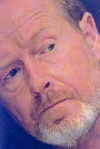 The
excellent television series "The Directors", created by
Media entertainment, Inc. for the American Film Institute turned
its attention to Ridley Scott in 2002. Covering all of his films
up to Black Hawk Down and mentioning forthcoming Matchstick
Men and Tripoli, some of the great actors from his films
and others who have worked with him commenting, the most noteworthy
was Harrison Ford speaking about Blade Runner. I don't say
that simply because this is a Blade Runner site - I have after all
seen most of Ridley's films. No, this is notable for the past uncomfortable
memories between Harrison and Ridley, and Harrison's general reluctance
to say much about Blade Runner. The
excellent television series "The Directors", created by
Media entertainment, Inc. for the American Film Institute turned
its attention to Ridley Scott in 2002. Covering all of his films
up to Black Hawk Down and mentioning forthcoming Matchstick
Men and Tripoli, some of the great actors from his films
and others who have worked with him commenting, the most noteworthy
was Harrison Ford speaking about Blade Runner. I don't say
that simply because this is a Blade Runner site - I have after all
seen most of Ridley's films. No, this is notable for the past uncomfortable
memories between Harrison and Ridley, and Harrison's general reluctance
to say much about Blade Runner.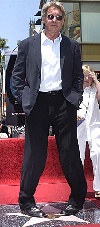 A couple of years ago, in the Edge of Blade Runner documentary,
Ridley effectively extended the olive branch by fully acknowledging
that back in the early '80s, he didn't treat actors as attentively
as he later learned to do. It seems Harrison has now also mellowed
with the passing of decades and acknowledges not just Ridley as
a great director, but Blade Runner as a great film. So much
so, that the makers of this Directors documentary used Harrison
Ford's comments to open up the programme.
A couple of years ago, in the Edge of Blade Runner documentary,
Ridley effectively extended the olive branch by fully acknowledging
that back in the early '80s, he didn't treat actors as attentively
as he later learned to do. It seems Harrison has now also mellowed
with the passing of decades and acknowledges not just Ridley as
a great director, but Blade Runner as a great film. So much
so, that the makers of this Directors documentary used Harrison
Ford's comments to open up the programme.
Harrison Ford (Introduction to programme):
"He's a wonderful storyteller and a very bold director. He
really does take chances. He picks material that is original and
fresh and difficult. And, he's a real soldier in the trenches. He
works mighty hard and he has wonderful focus and energy to bring
to the process. And, when it comes down to it, Ridley is quite intellectual
in a way, without losing any of his visceral capacity. The films
that he does are based on interesting ideas."
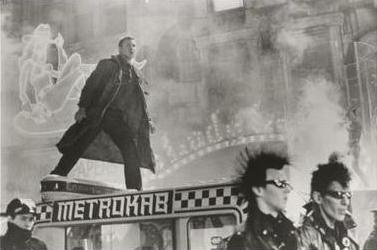 The
Blade Runner section of the documentary starts with the Narrator
speaking over [photo of Deckard standing
on Metrokab]: "In 1982 came the chilling and mesmerising
futuristic thriller, Blade Runner. The film was not particularly
well received on its release, but over time, Blade Runner
has achieved cult status with the viewing public all over the world
... and also the initially skeptical critical establishment. The
stars were Harrison Ford, Rutger Hauer, Sean Young, Edward James
Olmos and Daryl Hannah. The
Blade Runner section of the documentary starts with the Narrator
speaking over [photo of Deckard standing
on Metrokab]: "In 1982 came the chilling and mesmerising
futuristic thriller, Blade Runner. The film was not particularly
well received on its release, but over time, Blade Runner
has achieved cult status with the viewing public all over the world
... and also the initially skeptical critical establishment. The
stars were Harrison Ford, Rutger Hauer, Sean Young, Edward James
Olmos and Daryl Hannah.
[clip Deckard in Bryant's office, "They
jumped a shuttle ... I need the old Blade Runner."]
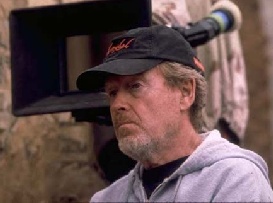 Ridley
Scott: "Blade Runner has taken its place in Science
Fiction history as a pretty good view of urban scifi, y'know. When
really, of course, its like a Philip Marlowe or Elmore Leonards
story told in the future. [clip of Pris approaching
The Bradbury as RS continues speaking] And all of us in that
melting pot - we came up with the proscenium which ... I think the
proscenium itself became ... was really just too rich. And I think
because people hadn't seen that before, I think it overshadowed
what was actually a very well written, but fairly straightforward
story with some wonderfully inventive characters. And I think what
happened is the proscenium just kind of ... was this major distraction." Ridley
Scott: "Blade Runner has taken its place in Science
Fiction history as a pretty good view of urban scifi, y'know. When
really, of course, its like a Philip Marlowe or Elmore Leonards
story told in the future. [clip of Pris approaching
The Bradbury as RS continues speaking] And all of us in that
melting pot - we came up with the proscenium which ... I think the
proscenium itself became ... was really just too rich. And I think
because people hadn't seen that before, I think it overshadowed
what was actually a very well written, but fairly straightforward
story with some wonderfully inventive characters. And I think what
happened is the proscenium just kind of ... was this major distraction."
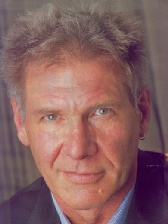 Harrison
Ford: "Although I had worked in Star Wars in
a kind of futuristic context, it was a very different flavour [photo
of Deckard being throttled by Zhora] that was on the menu
with Blade Runner. It was a dark view of the future. It's
no secret that Ridley and I had a degree of disagreement about the
character that I play, Deckard. Ridley's ambition, and he held on
to it, was that the audience come to understand at a point in time,
[photo of Deckard and Rachael kissing against
the Venetian blind] Harrison
Ford: "Although I had worked in Star Wars in
a kind of futuristic context, it was a very different flavour [photo
of Deckard being throttled by Zhora] that was on the menu
with Blade Runner. It was a dark view of the future. It's
no secret that Ridley and I had a degree of disagreement about the
character that I play, Deckard. Ridley's ambition, and he held on
to it, was that the audience come to understand at a point in time,
[photo of Deckard and Rachael kissing against
the Venetian blind]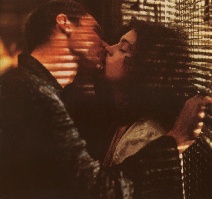 quite near the end of the film, that Deckard was as well, a replicant.
But I felt that the audience should have one clear emotional representative
on screen - someone that they could identify with and understand.
And be able to develop an affinity for them [photo
of Deckard about to uncover Pris in Sebastian's apartment]
based on their common humanity, not just their representation of
human feelings. But other than that, I think we were ... we easily
came to agreement on most of the rest of what we did."
quite near the end of the film, that Deckard was as well, a replicant.
But I felt that the audience should have one clear emotional representative
on screen - someone that they could identify with and understand.
And be able to develop an affinity for them [photo
of Deckard about to uncover Pris in Sebastian's apartment]
based on their common humanity, not just their representation of
human feelings. But other than that, I think we were ... we easily
came to agreement on most of the rest of what we did."
[clip of Pris beating up Deckard]
Harrison Ford: [photo
of Deckard and Gaff in spinner] "What is interesting
to me is that after Blade Runner, Ridley went on to make
any number of really interesting films. Blade Runner could
easily have been the height of a career, but he's continued to develop
as a director and to really find very challenging and interesting
work to do."
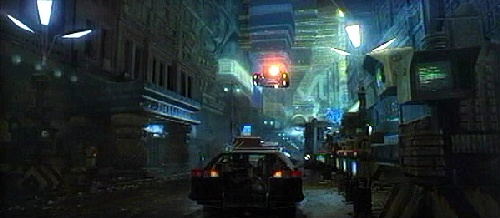
Now then Ridley. I understand that some people in 1982 may have
thought the proscenium, particularly the cityscape, was a bit too
rich, but I'm pretty sure many of the fans of Blade Runner over
the years absolutely love the rich detail in the sets. They not
only define Blade Runner, but also stand as an enduring example
for so many other films that have followed.
And Harrison. Wonderful things you said on this programme! Now,
perhaps you could see your way to doing ten minutes on that ever-delayed
BR:SE DVD ??? Would it help if I say, "Please"?
-
Netrunner, 3rd June, 2003.

|

![]()

 The
excellent television series "The Directors", created by
Media entertainment, Inc. for the American Film Institute turned
its attention to Ridley Scott in 2002. Covering all of his films
up to Black Hawk Down and mentioning forthcoming Matchstick
Men and Tripoli, some of the great actors from his films
and others who have worked with him commenting, the most noteworthy
was Harrison Ford speaking about Blade Runner. I don't say
that simply because this is a Blade Runner site - I have after all
seen most of Ridley's films. No, this is notable for the past uncomfortable
memories between Harrison and Ridley, and Harrison's general reluctance
to say much about Blade Runner.
The
excellent television series "The Directors", created by
Media entertainment, Inc. for the American Film Institute turned
its attention to Ridley Scott in 2002. Covering all of his films
up to Black Hawk Down and mentioning forthcoming Matchstick
Men and Tripoli, some of the great actors from his films
and others who have worked with him commenting, the most noteworthy
was Harrison Ford speaking about Blade Runner. I don't say
that simply because this is a Blade Runner site - I have after all
seen most of Ridley's films. No, this is notable for the past uncomfortable
memories between Harrison and Ridley, and Harrison's general reluctance
to say much about Blade Runner. A couple of years ago, in the Edge of Blade Runner documentary,
Ridley effectively extended the olive branch by fully acknowledging
that back in the early '80s, he didn't treat actors as attentively
as he later learned to do. It seems Harrison has now also mellowed
with the passing of decades and acknowledges not just Ridley as
a great director, but Blade Runner as a great film. So much
so, that the makers of this Directors documentary used Harrison
Ford's comments to open up the programme.
A couple of years ago, in the Edge of Blade Runner documentary,
Ridley effectively extended the olive branch by fully acknowledging
that back in the early '80s, he didn't treat actors as attentively
as he later learned to do. It seems Harrison has now also mellowed
with the passing of decades and acknowledges not just Ridley as
a great director, but Blade Runner as a great film. So much
so, that the makers of this Directors documentary used Harrison
Ford's comments to open up the programme. The
Blade Runner section of the documentary starts with the Narrator
speaking over [photo of Deckard standing
on Metrokab]: "In 1982 came the chilling and mesmerising
futuristic thriller, Blade Runner. The film was not particularly
well received on its release, but over time, Blade Runner
has achieved cult status with the viewing public all over the world
... and also the initially skeptical critical establishment. The
stars were Harrison Ford, Rutger Hauer, Sean Young, Edward James
Olmos and Daryl Hannah.
The
Blade Runner section of the documentary starts with the Narrator
speaking over [photo of Deckard standing
on Metrokab]: "In 1982 came the chilling and mesmerising
futuristic thriller, Blade Runner. The film was not particularly
well received on its release, but over time, Blade Runner
has achieved cult status with the viewing public all over the world
... and also the initially skeptical critical establishment. The
stars were Harrison Ford, Rutger Hauer, Sean Young, Edward James
Olmos and Daryl Hannah. Ridley
Scott: "Blade Runner has taken its place in Science
Fiction history as a pretty good view of urban scifi, y'know. When
really, of course, its like a Philip Marlowe or Elmore Leonards
story told in the future. [clip of Pris approaching
The Bradbury as RS continues speaking] And all of us in that
melting pot - we came up with the proscenium which ... I think the
proscenium itself became ... was really just too rich. And I think
because people hadn't seen that before, I think it overshadowed
what was actually a very well written, but fairly straightforward
story with some wonderfully inventive characters. And I think what
happened is the proscenium just kind of ... was this major distraction."
Ridley
Scott: "Blade Runner has taken its place in Science
Fiction history as a pretty good view of urban scifi, y'know. When
really, of course, its like a Philip Marlowe or Elmore Leonards
story told in the future. [clip of Pris approaching
The Bradbury as RS continues speaking] And all of us in that
melting pot - we came up with the proscenium which ... I think the
proscenium itself became ... was really just too rich. And I think
because people hadn't seen that before, I think it overshadowed
what was actually a very well written, but fairly straightforward
story with some wonderfully inventive characters. And I think what
happened is the proscenium just kind of ... was this major distraction." Harrison
Ford: "Although I had worked in Star Wars in
a kind of futuristic context, it was a very different flavour [photo
of Deckard being throttled by Zhora] that was on the menu
with Blade Runner. It was a dark view of the future. It's
no secret that Ridley and I had a degree of disagreement about the
character that I play, Deckard. Ridley's ambition, and he held on
to it, was that the audience come to understand at a point in time,
[photo of Deckard and Rachael kissing against
the Venetian blind]
Harrison
Ford: "Although I had worked in Star Wars in
a kind of futuristic context, it was a very different flavour [photo
of Deckard being throttled by Zhora] that was on the menu
with Blade Runner. It was a dark view of the future. It's
no secret that Ridley and I had a degree of disagreement about the
character that I play, Deckard. Ridley's ambition, and he held on
to it, was that the audience come to understand at a point in time,
[photo of Deckard and Rachael kissing against
the Venetian blind] quite near the end of the film, that Deckard was as well, a replicant.
But I felt that the audience should have one clear emotional representative
on screen - someone that they could identify with and understand.
And be able to develop an affinity for them [photo
of Deckard about to uncover Pris in Sebastian's apartment]
based on their common humanity, not just their representation of
human feelings. But other than that, I think we were ... we easily
came to agreement on most of the rest of what we did."
quite near the end of the film, that Deckard was as well, a replicant.
But I felt that the audience should have one clear emotional representative
on screen - someone that they could identify with and understand.
And be able to develop an affinity for them [photo
of Deckard about to uncover Pris in Sebastian's apartment]
based on their common humanity, not just their representation of
human feelings. But other than that, I think we were ... we easily
came to agreement on most of the rest of what we did."